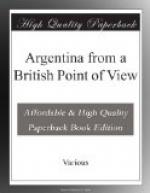All along the sides of the roads were little farms, apparently uncultivated, except for small patches of wonderfully grown maize and browning linseed. Practically all these farms are owned by Swiss and German peasants, each one with his small herd of cows and working bullocks.
We changed our ponies every three or four leagues, always going at the same jog-trot, stopping occasionally at a wayside inn to wet our parched throats with fresh well water (with a drop of cana in it to kill the microbes), and smoking hard all the time to keep off the swarms of mosquitoes.
After travelling ten leagues or so we began to leave these habitations behind us, and got into wilder country with no fences, only long stretches of undulating land, dotted with patches of splendid-looking trees and enticing shade.
The road occasionally crossed small streams, which gradually became more tropical looking, until we came to quite a large river, two or three hundred metres wide, looking beautifully peaceful and oily. Standing above on the bank, in the shade of some magnificent quebracho trees, we looked down upon this lazy stretch of perfect scenery, when suddenly there was a slight disturbance in the water and a small black dot appeared on the top of the water. The capataz at once pulled out his revolver, all of us doing likewise, only to have to put them back again, as the dot had disappeared as quickly as it came. This was the first sign of wild animal life we saw, the “jacare” or alligator. In the more civilised parts of the Chaco, these animals, as well as the carpincho or water-hog, are getting quite rare, and having been so much shot at and worried they need the most careful stalking.
As we got further away, we came upon many more of these streams, all looking much the same; some had bridges over them made of quebracho logs, laid endways on and covered with earth, very dangerous to cross after wet weather or floods, especially at night, as they are generally full of holes where the earth has fallen in.
At 10 a.m. each day we unsaddled for lunch, which was generally composed of “charque” or salted beef, biscuits, and coffee. The first night we slept at the last habitation which we saw, a small wayside inn. Arriving there late in the evening, we had the greatest difficulty in obtaining entrance on account of the chorus of barking, snapping dogs, and on account of the innkeeper’s fear of drunken gauchos.
Another early start on the second day saw us well on our journey by siesta time, which we spent on the edge of a very fine forest. The afternoon was very hot, and we did not start off again until 4 o’clock. During the evening we swam across a small river which we found overflowing its banks on account of the local rains, and, as darkness fell, we found it almost impossible to see our way on account of the fireflies, which made such a glare in front of us that the slight track which we had been following was almost invisible.




